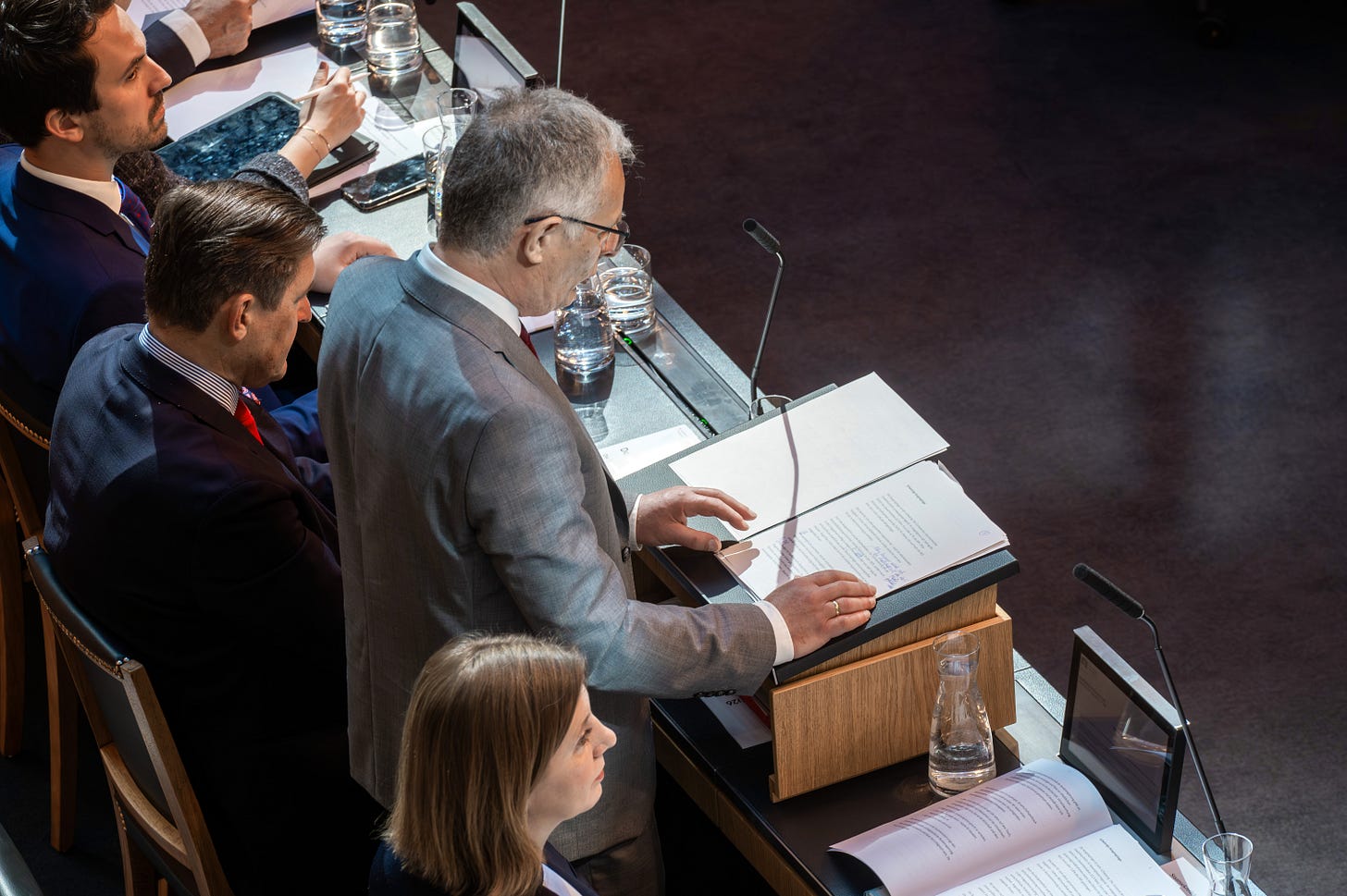Won't Somebody Please Think Of The Car Owners?
Austria's new government has targeted environmental subsidies in cutting €6.4 billion from the budget in 2025

Servus!
Two weeks ago, as I mentioned in last week’s newsletter on an entirely different subject, finance minister Markus Marterbauer—an independent nominated by the Social Democratic Party (SPÖ)—unveiled his first budget before parliament. The two-year budget for fiscal years 2025 and 2026 includes projected savings of €6.4 billion in 2025 and €8.7 billion in 2026 as part of the process of beginning to bring Austria’s budget deficit back down below 3 percent of GDP as mandated by the European Union’s Maastricht criteria.
The crossover isn’t projected to happen until 2028, when the budget deficit should come in at around 3 percent before going down to 2.8 percent in 2029. Until then, deficits will remain stubbornly high: 4.5 percent this year and 4.2 percent next year. The government’s projections, however, hinge on them continuing to find new savings every year so that the annual amount consolidated grows to €11.2 billion in 2027, €13.1 billion in 2028, and €14.6 billion in 2029. They also foresee a turnaround in Austria’s economic performance, with a return to GDP growth coming in 2026.
One of the government’s main targets in this initial round of savings has been environmental measures. The largest single saving of €2 billion per annum comes from axing the Klimabonus, the annual payout to Austrian residents that was designed to offset the effects of the country’s tax on CO2 (which remains in place). But that’s not all. In 2025, the government will strike €328.5 million in funding for the climate and energy fund, €177 million for the green transition in industry, and €120 million for the Klimaticket, the subsidized annual pass for Austria’s public transport network whose sticker price will be unfrozen beginning next year.
The government has also fiddled with the tax code to eliminate certain green benefits. Electric cars will henceforth be taxed at the same rate as gas-powered ones for insurance purposes, while value added tax will apply to purchases of photovoltaic panels. These two measures are projected to raise €65 million and €175 million in 2025 respectively.
Marterbauer has successfully identified several problems with the previous government’s environmental policies. First, they were expensive and often unpaid for, implemented at a time when the government was also cutting income and corporation taxes and eliminating ‘bracket creep.’ Between 2019 and 2024, while the state’s outgoings went up from 49.1 percent of GDP to 56.3 percent, incomings only increased from 49.6 percent to 51.6 percent. Austria’s current budget problems stem in part from the previous government’s irresponsibility and incongruous behavior. Second, and especially in the case of the Klimabonus, their policies’ intentions did not match their outcomes. The further one lived from an urban center, the larger one’s Klimabonus was, and thus those who maintained less environmentally-friendly lifestyles were in effect rewarded for it, which in turn undermined the nudge effect the CO2 tax was supposed to have. The Klimabonus was an economic and political disaster.
The green transformation, however, is an essential and expensive matter that likely won’t happen by itself, and cuts to the climate and energy fund and the green transition in industry as well as the Klimaticket may slow down that process. The government is also guilty of absolving some sins by committing new ones, axing the Klimabonus but softening the blow of its absence by increasing the size of the commuting allowance—a tax deduction for those who get to work by car—from €2 per kilometer to €6. This move will only cost €110 million as opposed to €2 billion, but its implications for the environment and changing people’s habits are more-or-less the same. Plus ça change.
Bis bald!
Thank you for reading The Vienna Briefing. Nothing beats a personal recommendation; if you know someone who would be interested in reading this newsletter, consider sharing it with them today.
The Vienna Briefing is a reader-supported publication. Your one-time or monthly tips make my work on this newsletter possible and help keep The Vienna Briefing free for everyone.
Trump Postpones Tariffs—Again
U.S. president Donald Trump has postponed the implementation of 50 percent tariffs on imports from the European Union until July 9, allowing time for further negotiations between the two sides. The Austrian Institute of Economic Research estimates that 50 percent tariffs on EU goods would cause Austria’s economy to contract by 0.68 percent.
Kurz Verdict Overturned
Former chancellor Sebastian Kurz has had his guilty verdict in the first instance for making false statements to a parliamentary committee investigating the Ibiza affair overturned on appeal. A guilty verdict against his former chief of cabinet Bernhard Bonelli was upheld, however.
Eurovision Winner Wants Israel Out
Israel should not take part in next year’s Eurovision Song Contest in Austria, this year’s winning artist JJ said in an interview last week. His remarks earned an unusual rebuke from President Alexander Van der Bellen, who said one should differentiate between support for Israel and criticism of the Netanyahu government.



